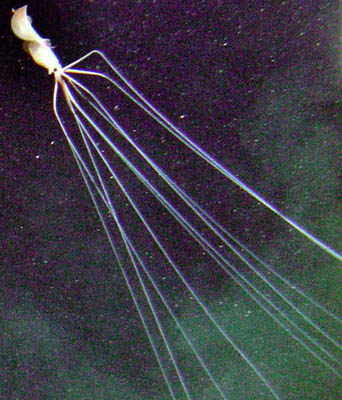The lure is just 16 blue lights embedded around the circumference of a round epoxy mold that is shaped like the jelly. When caught in the clutches of a predator the jelly produces a light display that is a pinwheel of light that is basically a call for help. It serves to attract the attention of a larger predator that may attack their attacker thereby affording them an opportunity for escape. This kind of "flashy" bioluminescent display is called a burglar alarm because just like an alarm it attracts attention, so I thought it might work to lure predators into the field of view of a camera.A) That is a very cool research tool, and
And it turned out that it did. In fact the very first time we turned on that pinwheel display it attracted a squid over six feet long that is so new to science it can't be placed in any known scientific family. I couldn't have asked for a better proof of concept.
B) They found a squid "so new" it can't even be identified to family? Who is this beast? Why haven't I heard about it before? Is anyone working on describing it? Where can I find a picture?
Although it is crazy, there's precedent. Ever heard of the big-fin (or long-arm (or elbow)) squid?

It's so weird that scientists decided it didn't belong in any of the known families of squid, and invented a new family for it: Magnapinnidae.
Can't wait to find out if Widder's brand new squid merits a brand new family, too!



Comments